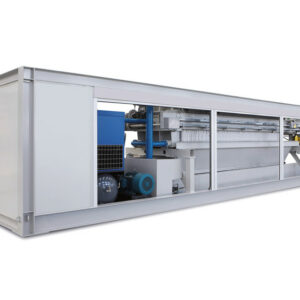Filter press is a commonly used solid-liquid separation technology in wastewater treatment processes. It is a device that uses pressure filtration to remove solid particles from wastewater.
In wastewater treatment, filter press is used to separate solids from liquid in sludge. The sludge is pumped into the filter press and the liquid is forced through a series of filter plates under high pressure, leaving behind a cake of solid material.
Filter press is particularly effective in wastewater treatment because it can handle large volumes of sludge and produce a dry cake of solid material, reducing the volume of material that needs to be disposed of. It is also effective in removing a wide range of solid particles, including organic matter, bacteria, and viruses.
There are several advantages to using filter press in wastewater treatment. These include:
High efficiency: Filter press can remove a high percentage of solids from wastewater, producing a dry cake of solid material.
Cost-effective: Filter press is a cost-effective solid-liquid separation technology, requiring minimal operator intervention and energy usage.
Versatility: Filter press can be used to treat a wide range of wastewater types, including industrial and municipal wastewater.
Environmental benefits: By reducing the volume of material that needs to be disposed of, filter press can reduce the environmental impact of wastewater treatment.
Overall, filter press is an effective and efficient solid-liquid separation technology that is widely used in wastewater treatment processes. By removing solids from wastewater, it can improve the quality of the treated wastewater and reduce the environmental impact of wastewater treatment.
How does filter press compare to other solid-liquid separation technologies in terms of efficiency?
Filter press is one of several solid-liquid separation technologies used in the industry, and its efficiency can vary depending on the specific application and operating conditions. Here is how filter press compares to some other common solid-liquid separation technologies in terms of efficiency:
Centrifuges: Centrifuges are often used for solid-liquid separation in industries such as food and beverage, pharmaceutical, and chemical. They use centrifugal force to separate the solids from the liquid. Centrifuges can be highly efficient, but they may require more energy and maintenance than filter press.
Belt filters: Belt filters are another solid-liquid separation technology commonly used in industries such as mining, wastewater treatment, and chemical. filter press in wastewater treatment They use a porous belt to separate solids from liquid. Belt filters can be efficient for large volumes of sludge, but they may require more space and maintenance than filter press.
Gravity thickeners: Gravity thickeners are often used for solid-liquid separation in wastewater treatment plants. They use gravity to settle the solids to the bottom of a tank, leaving the liquid on top. Gravity thickeners can be less efficient than filter press for removing solids from wastewater, but they may be more cost-effective for certain applications.
Overall, the efficiency of solid-liquid separation technologies can vary depending on the specific application and operating conditions. In general, filter press can be a highly efficient solid-liquid separation technology, particularly for applications where a high percentage of solids needs to be removed from the liquid. However, other technologies such as centrifuges, belt filters, and gravity thickeners may be more suitable for certain applications, depending on factors such as volume, space, cost, and maintenance requirements.
